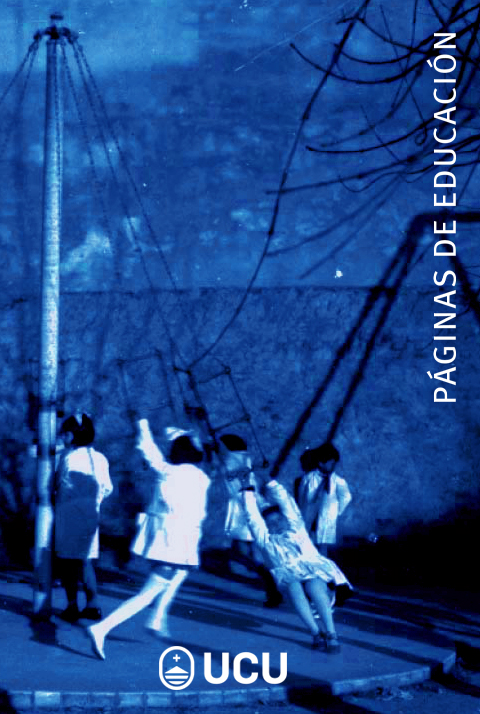El impacto del conflicto en Siria en el desarrollo educativo y conductual de los estudiantes: perspectivas de los profesores de escuelas intermedias en la ciudad de Homs
DOI:
https://doi.org/10.22235/pe.v16i2.3172Palabras clave:
conflicto, Siria, nivel educativo, nivel de comportamientoResumen
Este estudio tuvo como objetivo investigar el impacto del conflicto sirio en el desarrollo educativo y conductual de los estudiantes en la ciudad de Homs, tal como es percibido por los profesores. La investigación empleó un enfoque analítico descriptivo y recopiló datos a través de un cuestionario. La muestra del estudio consistió en 130 profesores de escuelas secundarias de la Dirección de Educación en Homs. Los hallazgos revelaron que, desde la perspectiva de los profesores, existe un efecto moderado en el desarrollo educativo y conductual de los estudiantes. La respuesta promedio para toda la muestra fue de 3.07, equivalente al 61.50%. Específicamente, los resultados indicaron que la influencia en el aspecto educativo tuvo una puntuación media de 3.41, mientras que el efecto en el comportamiento recibió una puntuación promedio de 2.75. Basándonos en estos resultados, se recomienda hacer esfuerzos para facilitar la integración de los estudiantes en las escuelas. Además, es aconsejable fortalecer la participación tanto de organizaciones locales como internacionales en el apoyo financiero a las familias de los estudiantes. Además, la implementación de programas de rehabilitación y asesoramiento psicológico para los estudiantes es crucial para aliviar el trauma resultante de la guerra.
Descargas
Citas
Abu Hilal, M. M., & Al-Tahan, K. (2002). The relationship between innovative thinking, intelligence, and academic achievement among a sample of outstanding students in the United Arab Emirates. Journal of the Educational Research Center, 22(2), 155-171.
Abu Zakhar, F. (2017). The conflict in Libya and its impact on education. Eanlibya.
Akl, A. (2001). Towards a better calendar. Dar Al-Nahda Al-Arabiya: Beirut.
Al-Azizi, M., Abdo, H., & Maarit, B. (2018). The impact of wars and armed conflicts on the academic achievement of primary school students in the capital city from the teachers’ point of view. Andalus Journal for Humanities and Social Sciences, 5(16), 36-68. https://search.emarefa.net/detail/BIM-856393
Al-Jabali, A. M. (2009). Behavioral problems among children after the Gaza war and their relationship to some variables [Unpublished Master Thesis] Islamic University.
Al-Qadi, Y. (1981). Psychological counseling and educational guidance. Mars Publishing House.
Al-Sadiq, A. (2009). Psychological and social effects of the war in Darfur, as perceived by students of Darfur in government universities in the state of Khartoum [Unpublished Master Thesis]. University of Khartoum.
Al-Shami, F. (2019). Behavioral disorders resulting from war trauma among primary school students in Sana'a city. Journal of the Arabian Peninsula Center for Humanitarian Educational Research, 1(2), 62-90.
Annabaa Network. (2015). Education in times of war: Forced deprivation of the future of childhood. Annabaa Network. https://m.annabaa.org/arabic/education/4220
Arabiyat, B. (2007). Managing Classes and Organizing the Learning Environment. Dar Al Thaqafa.
Beharu, W. T. (2018). Psychological Factors Affecting Students Academic Performance Among Freshman Psychology Students in Dire Dawa University. Journal of Education and Practice, 9(4), 59-60. https://core.ac.uk/download/pdf/234641371.pdf
Coşkun, İ. (2018). Suriye’de Eğitimin Geleceği Ve Fırat Kalkanı Bölgesinde Eğitim Faaliyetleri. SETA.
Darwish, A. H. (2009). Achievement and motivation towards learning for primary school students after the war on Gaza. Palestinian Universities.
Desouki, K. (1988). Psychology repertoire. International House.
Diab, S. (2003). Research Methodology. Al-Quds Open University.
Syria: Two million children are out of school. (2018, 9 de julio). Fanack. https://fanack.com/ar/society/education/2-million-syrian-children-no-longer-attending-school/
Hamza, A., & Kazar, N. (2016). The Iraqi-American War and its Social Effects on Children in Iraqi Society. Journal of the College of Basic Education for Educational and Human Sciences, (28), 588-599. https://www.iasj.net/iasj/download/f60f1c404d6ad243
Jedouri, B. (2017). The role of immigrant services society of british Colombia and its responsibilities towards the integration of Syrian refugees. The Canadian Journal for Middle East Studies, 2(1), 78-126.
Jedouri, B. (2020). The reality of self-esteem among Syrian newcomers to Canada and Germany (Comparative study). International Journal of Scientific & Technology Research, 9(3), 5045-5053. https://www.ijstr.org/final-print/mar2020/The-Reality-Of-Self-esteem-Among-Syrian-Newcomers-To-Canada-And-Germanycomparative-Study.pdf
Mansi, M. (2000). Educational Calendar and Principles of Statistics. University Knowledge House.
Miqdadi, Y., Fatim, L., & Hussein, M. (2017, April 25-27). Post-traumatic stress disorder among Syrian refugee children in Zaatari camp [Paper presentation]. Conference “Education: Challenges and Future Prospects”, Yarmouk University, Jordan.
Mustafa, M. (2004). The family and the school and their role in the upbringing of the child. Cordoba House.
Ruwaih, A. A. (2022, March 21). Children and wars: Has the childhood of these Arab countries been lost? Najaf Post. https://www.najafpost.com/articles/view/details?id=7594
Saadeh, J., Abu Ziada, I., & Zamel, M. (2002). Behavioral problems among Palestinian children in the lower basic stage in Nablus governorate during the Al-Aqsa Intifada, as perceived by teachers, and their relationship to some variables. An-Najah University Journal of Research, 16(2), 547-588. https://repository.najah.edu/server/api/core/bitstreams/48a505dc-551f-470e-b8c8-88f1e90c3c6e/content
Sabawi, H. (2008). Conditions of primary education in light of the current circumstances from the point of view of families of students and teachers - a field study in the city of Mosul. Conductivity Studies Journal, (22), 127-142.
Shtewi, M. A. (2007). The impact of wars and armed conflicts on the living life of the Arab family. Damascus University Journal, 23(2), 172-194.
Souad, M., Tijani, B., & Tijani, J. (2021). Social intelligence and its relationship to academic achievement: A field study on third-year middle school students. Al-Jameh Journal of Psychological Studies and Educational Sciences, 6(2), 916-940.
United Nations Children's Fund. (2015). Education Under Fire. How conflict is depriving children of their schooling. https://www.unicef.org/mena/reports/education-under-fire
United Nations Children's Fund. (2016). Syria Education Sector Analysis (2010-2015). https://www.unicef.org/mena/reports/syria-education-sector-analysis-2010-2015
United Nations Children's Fund. (2018). Working to ensure that all children in the region have equal access to quality education. https://www.unicef.org/mena/ar
United Nations. (2012). The Secretary-General in launching the Education First initiative: access to more education reduces the chances of exposure to extreme poverty and hunger. https://news.un.org/ar/story/2012/09/165342
World Bank. (2017). The visible effects of the war in Syria may be just the tip of the iceberg. https://www.worldbank.org/en/news/press-release/2017/07/18/the-visible-impacts-of-the-syrian-war-may-only-be-the-tip-of-the-iceberg
Yaqubi, M. (1973). Child psychology. Directorate of Training and Education.
Descargas
Publicado
Cómo citar
Número
Sección
Licencia
Derechos de autor 2023 Páginas de Educación

Esta obra está bajo una licencia internacional Creative Commons Atribución 4.0.















